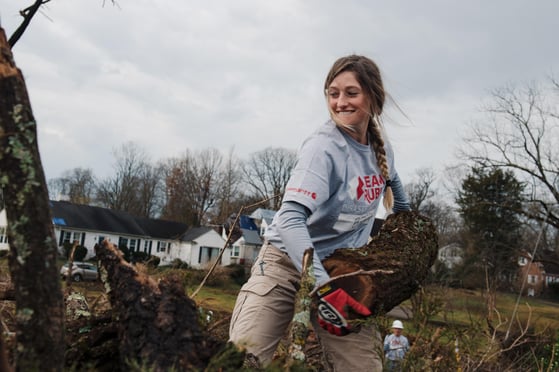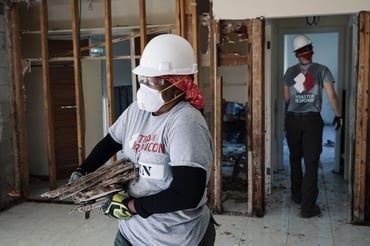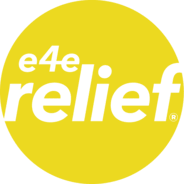At E4E Relief, we have the privilege of partnering with a variety of organizations that are making a powerful impact in the lives of individuals and communities around the world. One of those organizations is Team Rubicon, a veteran-led humanitarian organization that serves global communities before, during, and after disasters and crises.
.png?width=252&height=252&name=MicrosoftTeams-image%20(38).png) Team Rubicon was founded by two Marines in the wake of the devastating earthquake that hit Haiti in 2010. More than a decade later, the organization has become a force in disaster relief and released surpassed $50 million in annual fundraising.
Team Rubicon was founded by two Marines in the wake of the devastating earthquake that hit Haiti in 2010. More than a decade later, the organization has become a force in disaster relief and released surpassed $50 million in annual fundraising.
Recently, we sat down with Michael Gorham (at left), manager of strategic partnerships at Team Rubicon, to talk through what the organization has been working on this year, as well as how corporations can get more involved in their work.
Below are excerpts from our conversation, edited for brevity and clarity.
E4E Relief: To start, give us the elevator pitch on Team Rubicon and tell us what you're doing to accomplish your mission out in the world.
Michael Gorham: In simple terms, we help people on their worst days. That's our unspoken motto. We're truly a humanitarian organization.
A recent study showed that 84% of Americans live in an area impacted by a natural disaster in the last three years. Almost everyone everywhere is affected by disasters. A lot of them don't make the news cycle. They're what we call “low-attention disasters.” But everyone's affected somehow. And it’s not just natural disasters. In 2020, we assisted with Covid testing and vaccination support. In 2021, with the takeover of the Taliban in Afghanistan, we pivoted a lot of our efforts to helping resettle Afghan allies here in the United States.
Now, in 2023, we’re primarily back to business as usual. We have responded to over 100 disasters so far this year.
E4E Relief: That's incredible! So, what about you and your job? What is your role? And what does a typical day, if there is such a thing, look like?
MG: I've been with Team Rubicon for eight years now, so I've been here since almost its inception. I spent the first seven years on the operation side of the house. I wasa able to plan and execute all of the response and recovery and mitigation operations out here on the West Coast. Recently I transitioned to the strategic partnerships team. I've taken all of that experience and all that background and now I use it to get our partners into the field so we can form deeper relationships with our partners and work with them to help communities together.
To put this in practical terms, this is not necessarily a typical day, but it could be a typical season: Last year, in response to Hurricane Ian, we sent volunteers from more than 30 different corporate partners to help in Florida. Those corporate partners resulted in more than 400 people on the ground. We wouldn't be able to have nearly as big of an impact with Hurricane Ian if we didn't utilize the sweat equity from our corporate partners.
E4E Relief: Absolutely and that's one of the questions that I wanted to ask today: How does Team Rubicon work with companies?
MG: So, we have a three-pillar system in our partnerships. The first pillar is money to fuel the mission. And that's important because, as our founder always says, there are a million things more important than money, but they all cost money.
The second pillar is really to help us amplify our brand and really get our name out there. And then the last pillar is helping us get boots on the ground. We rely on our partners to join us in the field and really help us drive impact in those communities that are affected by disasters.
 E4E Relief: So, you mentioned you've already responded to 100 disasters. You've obviously been busy. What else is Team Rubicon working on this year?
E4E Relief: So, you mentioned you've already responded to 100 disasters. You've obviously been busy. What else is Team Rubicon working on this year?
MG: Just this month, we finalized a memorandum of agreement with FEMA, the Federal Emergency Management Agency. It outlines how our two organizations are going to cooperate in disaster, preparedness, response and recovery and several other emergency management operations. Overall, it's really a firm handshake between our two organizations, with a commitment to sharing information openly and helping us be able to respond quicker and have a larger impact in communities.
The MOA also gives us a seat at the table at the National Response Coordination Center, which is the place to be if you want to drive impact in communities affected by disasters. You want to be in that operation center so that you can hear the needs of the community right away, and then we can pivot and help where we need to.
E4E Relief: That’s exciting! What else is Team Rubicon excited about?
MG: Last year, we celebrated a pretty big milestone as an organization: We were able to eclipse $50 million in annual fundraising. That's so important because those dollars go back into the community. It's amazing to see the impact that we can have now compared to when we were a $1 million or $10 million organization.
We also have a Rebuild program that we launched around 2018. Typically, after a hurricane or a flood, we go into a home and do debris removal. We'll tear up the flooring. We'll tear up the carpeting. We'll give them back a gutted home, but a home that is ready to be repaired immediately.
Our Rebuild program takes that gutted home – especially the ones that are really bad – and rebuilds it back to its original glory. Except when they do, they put in waterproof flooring. They put in wind resistance and other fortified construction materials. So far, we've done over 700 homes between Texas, Puerto Rico, Alabama, Louisiana, Alaska, Kentucky and Florida, and we're going to start in Hawaii pretty soon.
We also noticed over the last couple of years that there has been a lack of skilled trades – workers who can do the electrical or the plumbing. So, we're going to open a trades academy for veterans. It will take them from apprentice all the way through journeyman so that when they're done with the academy and they've helped us in our journey to help rebuild these homes, they can turn around and go to a construction company and get a well-paying job. In the process, we’ll create this cycle of folks coming through and helping conduct these rebuilds and then moving on to bigger and better things for themselves.
 E4E Relief: That’s amazing. Last question before we let you get back to work: What do you want people to know about Team Rubicon that they might not already be aware of?
E4E Relief: That’s amazing. Last question before we let you get back to work: What do you want people to know about Team Rubicon that they might not already be aware of?
MG: First of all, we are not a Jeep club (laughs). We're also not exclusive to veterans. We're very passionate about veterans. Our staff and volunteers are probably 65 to 70% veterans, but by no means are we a veteran-centric organization. We just understand the value veterans bring and the service and community they desire. So, we're providing that to them while also using their skills and experience to help communities. But anyone can sign up to volunteer with us.
Also, no commitment is required. When you sign up, you get access to a map that shows you all the different events that are happening across the country on a regular basis, and you can come visit the map anytime you want. If you feel the itch, and you feel the desire, then we'll be here.
To learn more about Team Rubicon, visit their website.


